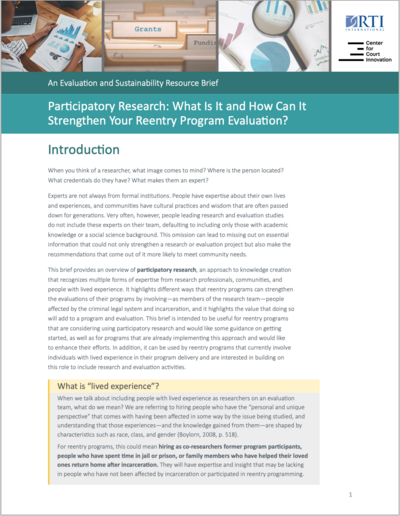Resource Brief: Participatory Research: What Is It and How Can It Strengthen Your Reentry Program Evaluation?
Brief
Topics:
Criminal and Juvenile Records
Evaluation and Sustainability
Program Quality and Performance Measurement
Second Chance Month
Reentry population:
Both Adults and Youth/Young Adults
Date:
Source:
RTI International and the Center for Justice Innovation
Resource Brief: Participatory Research: What Is It and How Can It Strengthen Your Reentry Program Evaluation?
Participatory research is an approach to knowledge creation that can strengthen evaluation. It uses multiple forms of expertise from research professionals, communities, and people with lived experience. People affected by the criminal legal system can play key roles on a reentry program evaluation team by:
- Identifying new research questions or outcomes that are important for communities to measure
- Conducting interviews and focus groups or administering surveys
- Presenting findings to funders, media, and the community where the reentry program community is located
Participatory approaches can strengthen an evaluation's validity, reliability, and relevance by:
- Challenging implicit biases and assumptions
- Creating more culturally responsive data collection instruments that use accessible language familiar to research participants
- Engaging previously hard-to-reach populations
- Eliciting more honest responses
- Shaping relevant recommendations that are informed by community knowledge
This resource brief from the Evaluation and Sustainability Training and Technical Assistance (ES TTA) team at RTI International and the Center for Justice Innovation (formerly the Center for Court Innovation) provides an overview of participatory research approaches and discusses ways that reentry programs can engage affected populations in the evaluation of their programs.




